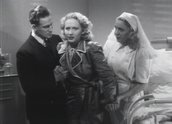


Into the Straight (1949)
Synopsis
Prominent Australian horse breeder WJ Curzon (George Randall) hires British trainer Hugh Duncan (James Workman) and his son Paul (Alan White). Soon after arriving at Curzon’s stud farm, St Aubins, Paul makes romantic moves on Curzon’s daughter, June (Nonnie Peifer). Meanwhile, Curzon’s irresponsible son, Sam (Charles Tingwell), a trainee doctor, returns to St Aubins with his flighty girlfriend, Zara Marlowe (Margo Lee). When June suffers crippling injuries in a horse riding accident, Paul turns his attentions to Zara.
Hugh supports June by encouraging her interest in music, eventually falling in love with her. After stealing from his father to pay a gambling debt, Sam visits Sydney and discovers Paul has secretly been training a horse for the Melbourne Cup. Following June’s recovery, Sam admits to the theft and the Curzon family travels to Melbourne for the running of the cup.
Curator’s notes
Into the Straight was the second of three features produced by Tom McCreadie and his elder brother Alec. Involved in exhibition and distribution since the 1920s, the McCreadies formed Embassy Pictures in 1940 and launched into features in 1948 with Always Another Dawn, a war drama which featured beloved Australian actor Charles Tingwell in his first lead role. Although the film was not a commercial success, Tingwell’s star quality was obvious and he was given top billing in Into the Straight despite playing a support role. Tingwell also made uncredited contributions to the screenplay by Zelma Roberts, who’d written Always Another Dawn (1948).
Promising audiences ‘thrills of the turf’, Into the Straight delivers plenty of exciting horseracing footage as thoroughbreds are put through their paces by breeder WJ Curzon and British trainers Hugh and Paul Duncan. The Victorian Racing Club staged a mock Melbourne Cup meeting at Flemington Racecourse especially for the film, and personalities such as legendary race caller Ken Howard and champion jockeys George Moore and Jack Purtell made guest appearances.
Made with one eye on the international market, Into the Straight is an odd mix of genres. The trackside action belongs to a no-nonsense B-movie and the drama surrounding June’s crippling injury and romantic entanglements on the long road to recovery frequently play like a ‘weepie’ movie of the times (see clip three). A cowboy singalong prior to June and Paul’s trip to the rodeo (see clip two) fits well enough into the picture but an extended sequence in which June plays a piano concerto she composed during her convalescence would likely have tested the patience of many viewers.
Made during the postwar immigration boom, Into the Straight presents the wide open spaces of Australia as a land of opportunity for Hugh and Paul, who have suffered severe setbacks in England. Apart from a few gentle jokes aimed at Paul’s roving eye for women, the newcomers are spared the mistrust and mockery often dished out to British characters in Australian movies.
Like many other Australian characters in authority and/or wealthy in pre-1970s Australian cinema, WJ Curzon sounds as English as the Duncans (see clip one). Bolstered by Tingwell’s fine performance and a lively turn by Margo Lee as a haughty cabaret singer, Into the Straight opened to strong business in Perth in July 1949 but did not fare well in Sydney in early 1950 when released at the same time as Charles Chauvel’s Australian hit Sons of Matthew (1949). The McCreadies bowed out of feature film production later that year with The Kangaroo Kid (1950).
Into the Straight was released in Perth in July 1949 and Sydney in January 1950.
- Overview
- Curator’s notes
- Video 3 clips
- Principal credits
- Find a copy
- Make a comment
- Map
- Add your review



